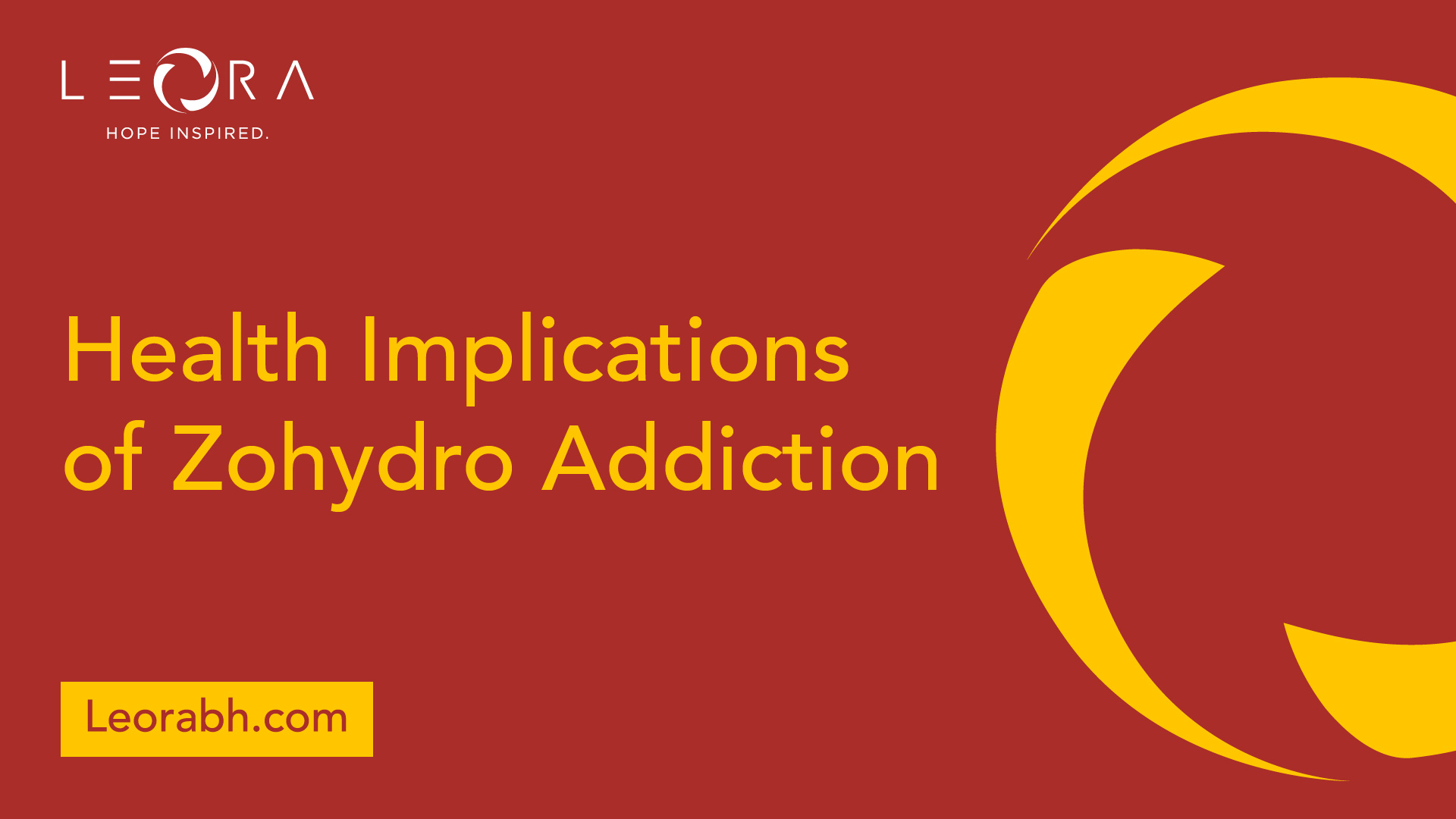What is Zohydro Addiction?
Discover the truth behind Zohydro addiction. Learn about risks, health implications, and resources for support. Don't miss out!
Understanding Zohydro Addiction
Zohydro addiction is a serious concern that requires a closer examination. To fully grasp the implications of Zohydro addiction, it is important to understand the drug itself and the risks associated with its misuse.

Introduction to Zohydro
Zohydro is an opioid drug derived from morphine, a natural substance extracted from the seed pod of various opium poppy plants. It is classified as an opioid pain reliever, sharing similarities with heroin in terms of its origins. Zohydro is prescribed to manage severe pain that requires long-term opioid treatment when other options are inadequate.
Risks of Zohydro Misuse
Misuse of Zohydro can lead to various health risks, including addiction, dependency, and tolerance. Prolonged use can result in physical and psychological dependence, making it challenging to discontinue use without experiencing withdrawal symptoms. It is essential to follow the prescribed dosage and not exceed the recommended duration of use to minimize the risk of dependence.
Zohydro addiction can have significant implications on driving and pregnancy. The drug can impair cognitive and motor functions, potentially leading to accidents or impaired driving ability. Additionally, Zohydro is not recommended for use during pregnancy as it may harm the fetus and cause life-threatening withdrawal symptoms in newborns. It is also not recommended for use while breastfeeding due to the potential transfer of the drug to the nursing baby through breast milk.
Another risk associated with Zohydro misuse is the potential for adverse health effects and interactions. Older adults may be at a higher risk of accidental misuse due to multiple prescriptions, and the drug can interact with other substances, such as alcohol and certain medications, leading to potentially harmful effects [2].
Understanding the risks of Zohydro misuse is crucial for both patients and healthcare professionals. Proper education, monitoring, and responsible use of this medication can help mitigate the potential harm associated with Zohydro addiction.

Health Implications of Zohydro Addiction
Zohydro addiction can have significant health implications, affecting various aspects of an individual's well-being. Understanding these implications is crucial for raising awareness and promoting informed decision-making.
Addiction and Dependency
Zohydro, classified as an opioid pain reliever, has origins similar to that of heroin. Continued use and misuse of Zohydro can lead to addiction and dependency. Addiction to Zohydro can have severe consequences on an individual's physical and mental health, relationships, and overall quality of life. It is essential to recognize the signs of addiction and seek appropriate help and support.
Impact on Driving and Pregnancy
One of the concerning health risks associated with Zohydro addiction is its impact on driving and pregnancy. Zohydro use can impair cognitive and motor functions, making it unsafe to operate a vehicle while under the influence. Driving under the influence of Zohydro increases the risk of accidents and harm to oneself and others.
Zohydro use during pregnancy can have adverse effects on both the mother and the developing fetus. It is not recommended to use Zohydro during pregnancy due to the potential harm it can cause to the fetus and the increased risk of life-threatening withdrawal symptoms in a newborn baby. Breastfeeding while using Zohydro is also discouraged as it can pass into breast milk and harm the nursing baby.
Health Risks and Interactions
Zohydro addiction poses various health risks, including the potential for accidental misuse in older adults due to multiple prescriptions and an increased risk of drug interactions. It is important to be aware of potential interactions between Zohydro and other substances, such as alcohol, sedatives, hypnotics, tranquilizers, and other opioids. These interactions can have detrimental effects on an individual's health and well-being.
To ensure safety and minimize risks, it is crucial to consult healthcare professionals and pharmacists regarding potential drug interactions and to disclose all medications and substances being used.
Understanding the health implications of Zohydro addiction is vital for individuals, healthcare providers, and communities at large. By recognizing the risks associated with Zohydro addiction, we can work towards prevention, early intervention, and effective treatment strategies to address this significant public health concern.

Managing Zohydro Use
When it comes to managing the use of Zohydro, it's essential to follow proper guidelines to minimize the risks associated with this medication. This section will cover important aspects such as dosage and individualization, withdrawal symptoms and side effects, and proper medication use.
Dosage and Individualization
The starting dose of Zohydro ER (extended-release) is individualized based on the patient's prior analgesic treatment experience and risk factors for addiction, abuse, and misuse. It is crucial to consult a healthcare professional who can assess your specific needs and determine the appropriate dosage.
It's important to strictly follow the prescribed dosage and avoid increasing it without medical guidance. Increasing the dosage without professional advice can increase the risk of adverse effects and potential addiction.
Withdrawal Symptoms and Side Effects
Abruptly stopping the use of Zohydro ER may lead to withdrawal symptoms, especially if the medication has been used for an extended period or in high doses. To prevent withdrawal, the dosage should be gradually reduced under the supervision of a healthcare professional.
Zohydro ER may cause side effects such as nausea, vomiting, constipation, lightheadedness, dizziness, or drowsiness. It's important to note that these side effects may decrease over time. If any of these effects persist or worsen, it is crucial to notify a healthcare professional or pharmacist.
Proper Medication Use
Proper medication use is vital to ensure the safe and effective management of Zohydro. Here are some key points to keep in mind:
- Take Zohydro ER exactly as prescribed by your healthcare professional. Do not alter the dosage or frequency without consulting them.
- Swallow the extended-release capsules whole. Do not crush, chew, or dissolve them, as this can lead to a rapid release of the medication and potential overdose.
- Do not consume alcohol or take other central nervous system depressants while using Zohydro ER, as it can increase the risk of respiratory depression and other adverse effects.
- Store Zohydro ER securely, away from children or individuals who may misuse or abuse the medication.
By adhering to the prescribed dosage, being aware of withdrawal symptoms and side effects, and using Zohydro ER properly, you can minimize the risks associated with this medication. Always consult with your healthcare professional for personalized guidance and monitor your response to the medication closely. If you have any concerns or questions, do not hesitate to reach out to your healthcare provider.
Zohydro ER: Extended-Release Formulation
Zohydro ER is an extended-release opioid formulation that is used for the management of severe pain that requires long-term opioid treatment when alternative options are inadequate. It contains hydrocodone bitartrate, which belongs to a class of drugs known as opioid analgesics. This extended-release formulation is designed to slowly release the medication into the body over a period of 12 hours, providing continuous pain relief.
Purpose and Usage
Zohydro ER is prescribed to individuals who experience severe and chronic pain that cannot be effectively managed by other treatment options. It is important to note that Zohydro ER is not intended for use on an as-needed basis, and it should only be used when alternative treatments have proven to be inadequate.
The extended-release nature of Zohydro ER allows for sustained pain relief throughout the day, reducing the frequency of medication dosing. This can be particularly beneficial for individuals with chronic pain conditions that require continuous relief.
Risks of Misuse and Overdose
Due to the potency and extended-release nature of Zohydro ER, there are inherent risks associated with its misuse and overdose. It is crucial for healthcare providers to educate patients on the proper use, storage, and disposal of this medication to prevent misuse or accidental ingestion by unauthorized individuals.
Swallowing Zohydro ER whole or taking it in larger amounts than prescribed can be potentially fatal. It is essential to follow the prescribed dosage and administration instructions provided by the healthcare professional. Taking excessive amounts of Zohydro ER can lead to serious health risks, including respiratory depression, overdose, and even death.
To mitigate the risks associated with Zohydro ER, it is imperative to closely monitor patients who are prescribed this medication. Healthcare providers should regularly assess the patient's response to treatment, evaluate the need for continued therapy, and adjust the dosage as necessary. Education about the signs of opioid overdose and the importance of seeking immediate medical attention in case of an overdose is crucial to ensure patient safety.
In summary, Zohydro ER is an extended-release formulation of hydrocodone used for the management of severe pain. It provides continuous pain relief over 12 hours, reducing the need for frequent dosing. However, due to its potency and extended-release nature, there are risks of misuse and overdose associated with Zohydro ER. Proper education, monitoring, and adherence to prescribed dosages are essential to ensure the safe and effective use of this medication.
Precautions and Monitoring
When it comes to the use of Zohydro ER, precautions and monitoring play a vital role in ensuring patient safety and minimizing the risks associated with opioid medications. Healthcare providers and patients alike should be aware of the importance of risk evaluation, mitigation, and ongoing patient monitoring.
Risk Evaluation and Mitigation
Before prescribing Zohydro ER, healthcare providers should assess each patient's risk for opioid addiction, abuse, or misuse. This evaluation involves considering factors such as a personal or family history of substance abuse or mental illness. Patients with a higher risk profile may require additional caution and careful monitoring.
It's crucial for healthcare providers to have open and honest discussions with their patients about the potential risks and benefits of Zohydro ER. By understanding a patient's individual circumstances and medical history, healthcare providers can make informed decisions regarding the appropriate use of this medication.
Patient Monitoring and Follow-Up
Monitoring patients who are prescribed Zohydro ER is essential to ensure their well-being and detect any signs of misuse, addiction, or adverse effects. Regular follow-up appointments allow healthcare providers to evaluate the patient's ongoing need for the medication and assess its effectiveness. During these visits, providers should inquire about the patient's pain levels, any side effects experienced, and any concerns or questions they may have.
Closely monitoring patients for signs of misuse or addiction is crucial. These signs can include taking higher doses than prescribed, exhibiting drug-seeking behavior, or experiencing withdrawal symptoms when the medication is ceased. If concerns arise regarding misuse or addiction, healthcare providers are encouraged to explore alternative treatment options.
Patients should be educated on the proper use of Zohydro ER, including the importance of taking the medication as prescribed and not sharing it with others. They should also be aware of the potential risks associated with Zohydro ER, such as dependence, addiction, and overdose. If any concerns or questions arise during the course of treatment, patients should promptly consult their healthcare provider.
By implementing robust precautions and monitoring measures, healthcare providers can help ensure the safe and appropriate use of Zohydro ER. Patient education, ongoing evaluation, and open communication between patients and providers are key components of a comprehensive approach to managing the risks associated with this medication.
Resources for Zohydro Addiction
When facing addiction, it is crucial to seek support and access resources that can provide guidance and assistance. If you or someone you know is struggling with Zohydro addiction, there are various support services and helplines available to offer help and support. Additionally, taking a holistic approach to treatment can greatly contribute to the recovery process.
Support Services and Helplines
Support services and helplines play a vital role in helping individuals navigate the challenges of addiction. These services provide a safe and confidential space for individuals to seek guidance, ask questions, and receive support. They are often staffed by trained professionals who can offer advice, resources, and referrals to treatment programs.
One such resource is the SAMHSA National Helpline, which received 833,598 calls in 2020, witnessing a 27% increase from the previous year. This helpline serves as a valuable resource for individuals seeking assistance with substance use disorders, including Zohydro addiction.
Holistic Approach to Treatment
Taking a holistic approach to addiction treatment involves addressing not only the physical aspects of addiction but also the psychological, emotional, and social factors that contribute to substance abuse. This approach recognizes that addiction is a complex issue that requires comprehensive care.
In Canada, resources and support services are available to individuals in need of help with substance use, including Zohydro addiction. These resources encompass various elements of a holistic approach to treatment. For instance, the National Youth Solvent Abuse Program and National Native Alcohol and Drug Abuse Program are culturally sensitive resources that cater to First Nation, Inuit, or Métis individuals.
Additionally, Canada-wide services are accessible to anyone, anywhere, at any time, providing assistance with substance use issues, including overdose prevention and tobacco cessation. These resources emphasize a comprehensive approach to addressing substance use, incorporating harm reduction centers, provincial and territorial health services, and programs for Indigenous peoples.
By utilizing support services and adopting a holistic approach to treatment, individuals struggling with Zohydro addiction can take important steps towards recovery. Remember, reaching out for help is a sign of strength, and there are resources available to support you on your journey to a healthier and happier life.
References
Find Your Inner Light
Related Articles
Contact Us
Leora Behavioral Health offers a comprehensive addiction treatment programs to help you get your life back on track.
Our trained professionals will work with you to develop a personalized treatment plan that meets your unique needs. If you or someone you know is struggling with addiction, reach out to Leora Behavioral Health today.


.svg)





.svg)
.svg)
.svg)
.svg)